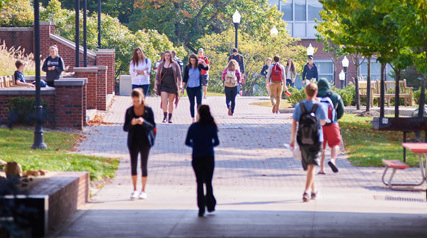Although America’s universities are globally acclaimed for the academic, co-curricular and sports education they provide to 20.5 million students, including almost a million from overseas, the role they play in developing the civic responsibilities of students is not so well known. But this is an important role for this country’s 4,726 universities. Universities in the U.S. have long been committed to educating thoughtful, knowledgeable and discerning future leaders and members of society. A university education helps students develop civic agency, defined as the skills, values and habits needed to work effectively with others to act on common problems across differences. Universities also contribute to the common good as important social institutions whose activities and resources create stronger communities.
The civic work of higher education in the United States rests on five pillars.
First, students are immersed in classrooms that provide them with a solid grounding in the skills, values and habits of the liberal arts: In his classic essay, “Only Connect,” William Cronon writes that liberally educated people are excellent communicators, they can listen and hear, read and understand, and talk with anyone. They also can write persuasively, solve a wide variety of puzzles and problems, and they respect rigor as a way of seeking truth. In doing so, they practice respect and humility, understand how to get things done, and nurture and empower people around them — seeing the connections that help one make sense of the world and act in creative ways to build the future. Whatever disciplines students study, they need to leave universities with these baseline skills, habits and values for contributing to the society in which they live.
Second, the university campus becomes a laboratory for practicing the arts of democracy. University campuses bring together a diverse mixture of students, creating a robust environment for students to learn how to work with others, across differences, to become problem solvers and engaged citizens. Students learn that the community you create is the one you live in.
In the United States, many universities have learned to leverage the campus as a laboratory for this kind of learning. Students who live in residential halls learn to work with a wide array of people to create community. They learn to harness the different voices and views they find in their residences to create strong and more resilient communities. Likewise, student organizations become sites for learning the language of civic opportunity and public work. At Denison, we have more than 160 student organizations. As students participate in and lead them, they acquire training in the arts of leadership, design thinking and other crucial skills of community-based problem solving.
Third, the university and the community connect in addressing local issues. In the United States, most colleges have a community engagement center that gets students into their localities to do community service and humanitarian outreach. Over the last decade, more faculty also have been teaching service-learning courses that blend academic work with community engagement.
For example: at Denison, our Alford Community Leadership & Involvement Center supports more than 600 students each year who interface with the town of Newark, which is about five miles from our campus. Our students have a long tradition of partnering with community organizations for which they provide support through their research and volunteerism.
At the same time, our faculty are conducting community-based research and service learning in support of this work. For example, an education course on literacy and learning exposes students to theories of literacy, while students work in an elementary school to help students with disabilities learn to read. The students put theory into practice and, in doing so, help an elementary school develop a program that serves at-risk children.
Over time, universities have learned that this work must be based on principles of respect and reciprocity. Rather than “acting on” the local community, students learn how to listen to, learn from, and work in partnership with local communities.
Fourth, universities prepare students for success in their personal, professional and civic lives. Students crave jobs that matter. For some, this means becoming social entrepreneurs or starting small-scale NGOs or seeking out companies that contribute to the social good. For other students, it means learning to work as professionals (e.g. doctors, lawyers, financial investors) with civic interests. And for some students it is about working for large companies that are taking on global issues. Universities (such as Denison) create pathways for our students who then can build lives and careers that blend their personal, professional and civic interests and responsibilities.
And fifth, universities are run as civically engaged institutions. Universities should be run in ways that create a stronger local civic fabric. This leads to tough management questions. Do we operate in ways that strengthen local businesses? Do we create room for our faculty and staff to participate in local civic life? How do we respond when our faculty, staff or students take public stands that may or may not benefit the university?
Universities need to model the same civic values that we seek to instill in our students. This has led many universities in the United States, including Denison, to extend our civic responsibilities to human resource policies and the way we purchase goods and services. For example, universities are putting in solar arrays, paying better wages, and purchasing goods and services locally and responsibly.
Universities can be, should be and often are engines of social progress. For this to happen at the scale our communities need, universities have to be committed to all five pillars. Much of this work is focused on students and helping them develop civic agency. And the work extends beyond this, as universities harness the power of faculty teaching and research, while also operating as social institutions whose policies and practices model civic action and increase local civic capacity.
